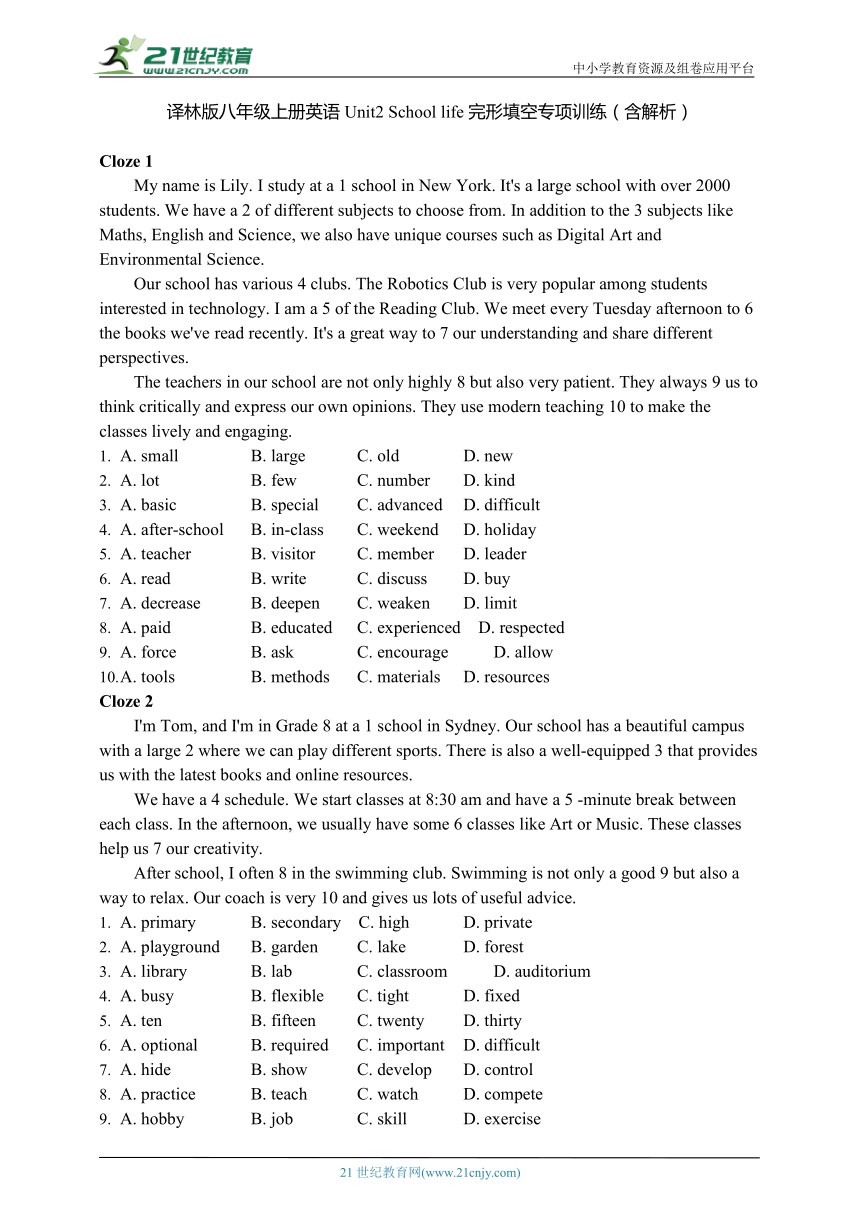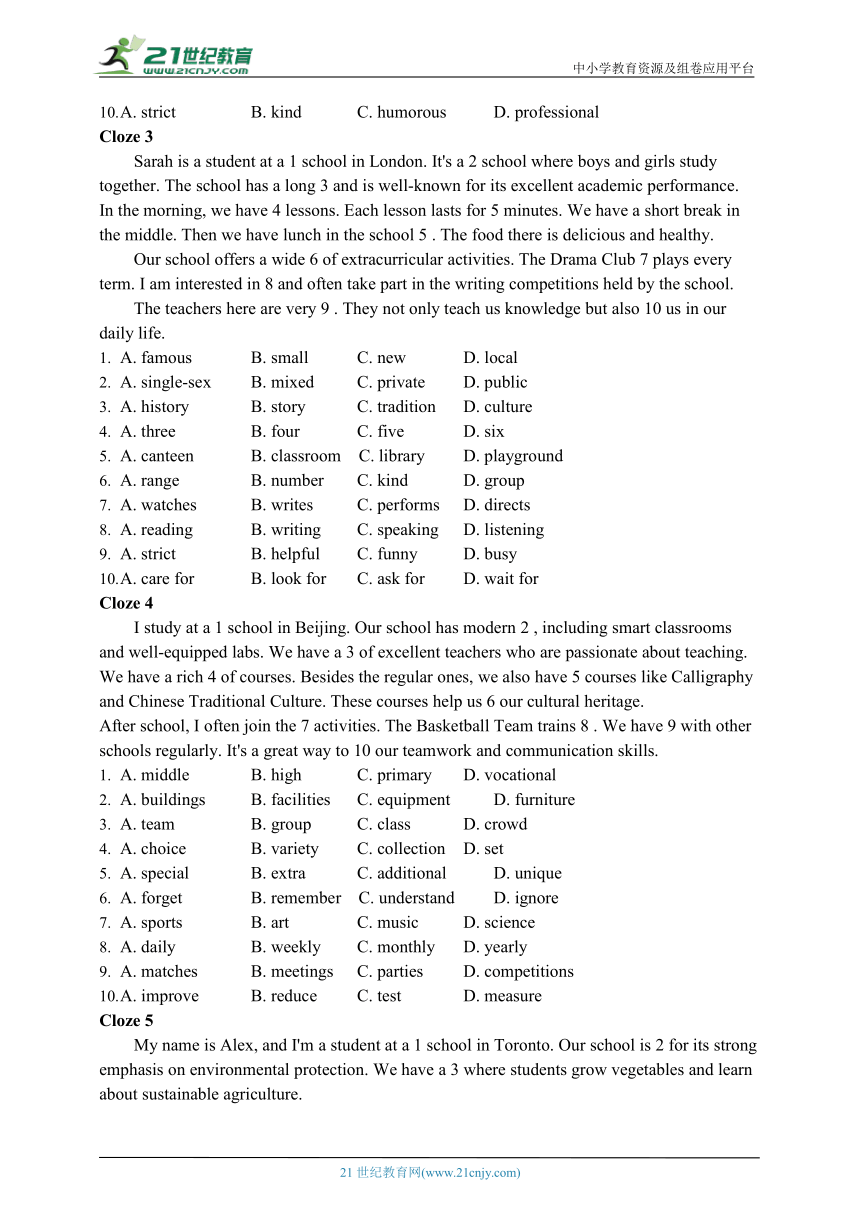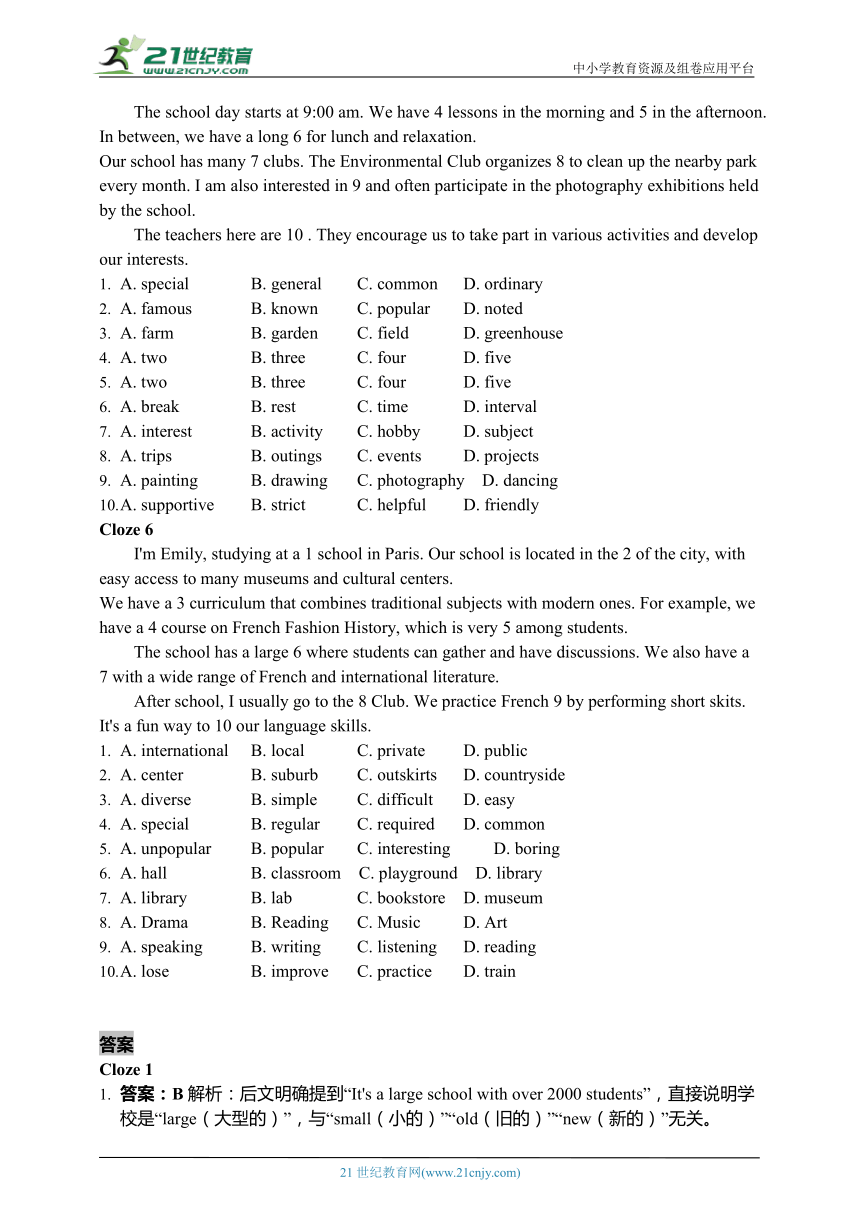Unit2 School life完形填空专项训练(含答案解析)—译林版八年级上册英语
文档属性
| 名称 | Unit2 School life完形填空专项训练(含答案解析)—译林版八年级上册英语 |  | |
| 格式 | docx | ||
| 文件大小 | 56.8KB | ||
| 资源类型 | 试卷 | ||
| 版本资源 | 译林版 | ||
| 科目 | 英语 | ||
| 更新时间 | 2025-08-10 17:26:46 | ||
图片预览



文档简介
中小学教育资源及组卷应用平台
译林版八年级上册英语Unit2 School life完形填空专项训练(含解析)
Cloze 1
My name is Lily. I study at a 1 school in New York. It's a large school with over 2000 students. We have a 2 of different subjects to choose from. In addition to the 3 subjects like Maths, English and Science, we also have unique courses such as Digital Art and Environmental Science.
Our school has various 4 clubs. The Robotics Club is very popular among students interested in technology. I am a 5 of the Reading Club. We meet every Tuesday afternoon to 6 the books we've read recently. It's a great way to 7 our understanding and share different perspectives.
The teachers in our school are not only highly 8 but also very patient. They always 9 us to think critically and express our own opinions. They use modern teaching 10 to make the classes lively and engaging.
A. small B. large C. old D. new
A. lot B. few C. number D. kind
A. basic B. special C. advanced D. difficult
A. after-school B. in-class C. weekend D. holiday
A. teacher B. visitor C. member D. leader
A. read B. write C. discuss D. buy
A. decrease B. deepen C. weaken D. limit
A. paid B. educated C. experienced D. respected
A. force B. ask C. encourage D. allow
A. tools B. methods C. materials D. resources
Cloze 2
I'm Tom, and I'm in Grade 8 at a 1 school in Sydney. Our school has a beautiful campus with a large 2 where we can play different sports. There is also a well-equipped 3 that provides us with the latest books and online resources.
We have a 4 schedule. We start classes at 8:30 am and have a 5 -minute break between each class. In the afternoon, we usually have some 6 classes like Art or Music. These classes help us 7 our creativity.
After school, I often 8 in the swimming club. Swimming is not only a good 9 but also a way to relax. Our coach is very 10 and gives us lots of useful advice.
A. primary B. secondary C. high D. private
A. playground B. garden C. lake D. forest
A. library B. lab C. classroom D. auditorium
A. busy B. flexible C. tight D. fixed
A. ten B. fifteen C. twenty D. thirty
A. optional B. required C. important D. difficult
A. hide B. show C. develop D. control
A. practice B. teach C. watch D. compete
A. hobby B. job C. skill D. exercise
A. strict B. kind C. humorous D. professional
Cloze 3
Sarah is a student at a 1 school in London. It's a 2 school where boys and girls study together. The school has a long 3 and is well-known for its excellent academic performance.
In the morning, we have 4 lessons. Each lesson lasts for 5 minutes. We have a short break in the middle. Then we have lunch in the school 5 . The food there is delicious and healthy.
Our school offers a wide 6 of extracurricular activities. The Drama Club 7 plays every term. I am interested in 8 and often take part in the writing competitions held by the school.
The teachers here are very 9 . They not only teach us knowledge but also 10 us in our daily life.
A. famous B. small C. new D. local
A. single-sex B. mixed C. private D. public
A. history B. story C. tradition D. culture
A. three B. four C. five D. six
A. canteen B. classroom C. library D. playground
A. range B. number C. kind D. group
A. watches B. writes C. performs D. directs
A. reading B. writing C. speaking D. listening
A. strict B. helpful C. funny D. busy
A. care for B. look for C. ask for D. wait for
Cloze 4
I study at a 1 school in Beijing. Our school has modern 2 , including smart classrooms and well-equipped labs. We have a 3 of excellent teachers who are passionate about teaching.
We have a rich 4 of courses. Besides the regular ones, we also have 5 courses like Calligraphy and Chinese Traditional Culture. These courses help us 6 our cultural heritage.
After school, I often join the 7 activities. The Basketball Team trains 8 . We have 9 with other schools regularly. It's a great way to 10 our teamwork and communication skills.
A. middle B. high C. primary D. vocational
A. buildings B. facilities C. equipment D. furniture
A. team B. group C. class D. crowd
A. choice B. variety C. collection D. set
A. special B. extra C. additional D. unique
A. forget B. remember C. understand D. ignore
A. sports B. art C. music D. science
A. daily B. weekly C. monthly D. yearly
A. matches B. meetings C. parties D. competitions
A. improve B. reduce C. test D. measure
Cloze 5
My name is Alex, and I'm a student at a 1 school in Toronto. Our school is 2 for its strong emphasis on environmental protection. We have a 3 where students grow vegetables and learn about sustainable agriculture.
The school day starts at 9:00 am. We have 4 lessons in the morning and 5 in the afternoon. In between, we have a long 6 for lunch and relaxation.
Our school has many 7 clubs. The Environmental Club organizes 8 to clean up the nearby park every month. I am also interested in 9 and often participate in the photography exhibitions held by the school.
The teachers here are 10 . They encourage us to take part in various activities and develop our interests.
A. special B. general C. common D. ordinary
A. famous B. known C. popular D. noted
A. farm B. garden C. field D. greenhouse
A. two B. three C. four D. five
A. two B. three C. four D. five
A. break B. rest C. time D. interval
A. interest B. activity C. hobby D. subject
A. trips B. outings C. events D. projects
A. painting B. drawing C. photography D. dancing
A. supportive B. strict C. helpful D. friendly
Cloze 6
I'm Emily, studying at a 1 school in Paris. Our school is located in the 2 of the city, with easy access to many museums and cultural centers.
We have a 3 curriculum that combines traditional subjects with modern ones. For example, we have a 4 course on French Fashion History, which is very 5 among students.
The school has a large 6 where students can gather and have discussions. We also have a 7 with a wide range of French and international literature.
After school, I usually go to the 8 Club. We practice French 9 by performing short skits. It's a fun way to 10 our language skills.
A. international B. local C. private D. public
A. center B. suburb C. outskirts D. countryside
A. diverse B. simple C. difficult D. easy
A. special B. regular C. required D. common
A. unpopular B. popular C. interesting D. boring
A. hall B. classroom C. playground D. library
A. library B. lab C. bookstore D. museum
A. Drama B. Reading C. Music D. Art
A. speaking B. writing C. listening D. reading
A. lose B. improve C. practice D. train
答案
Cloze 1
答案:B解析:后文明确提到“It's a large school with over 2000 students”,直接说明学校是“large(大型的)”,与“small(小的)”“old(旧的)”“new(新的)”无关。
答案:C解析:“a number of”是固定搭配,意为“许多”,修饰可数名词复数;“a lot of”才表示“许多”,此处缺少“of”;“few(很少)”与语境中“不同学科选择”矛盾;“a kind of(一种)”不符合句意。
答案:A解析:后文“Maths, English and Science”是基础学科,用“basic(基础的)”;“special(特殊的)”“advanced(高级的)”“difficult(困难的)”均不符合这些学科的属性。
答案:A解析:“clubs(俱乐部)”通常是课后活动,用“after-school(课后的)”;“in-class(课内的)”“weekend(周末的)”“holiday(假期的)”与俱乐部常规活动时间不符。
答案:C解析:“a member of...”表示“……的成员”,符合“我在阅读俱乐部”的语境;“teacher(老师)”“visitor(访客)”“leader(领导者)”未在文中体现。
答案:C解析:俱乐部活动应是“讨论”最近读的书,“discuss(讨论)”;“read(读)”“write(写)”“buy(买)”不符合分享感受的场景。
答案:B解析:讨论书籍能“加深”理解,“deepen(加深)”;“decrease(减少)”“weaken(削弱)”“limit(限制)”与“great way”表达的积极意义矛盾。
答案:C解析:形容老师的专业素养,“experienced(有经验的)”更贴切;“paid(有报酬的)”“educated(受过教育的)”“respected(受尊敬的)”并非核心特征。
答案:C解析:老师应“鼓励”学生批判性思考,“encourage(鼓励)”;“force(强迫)”语气过重;“ask(要求)”“allow(允许)”力度不足,不符合积极教学态度。
答案:B解析:“modern teaching methods(现代教学方法)”能让课堂生动,“methods(方法)”;“tools(工具)”“materials(材料)”“resources(资源)”侧重具体物品,而非方式。
Cloze 2
答案:B解析:“Grade 8(八年级)”属于中学,“secondary school(中学)”是通用说法;“primary(小学的)”不符合年级;“high school(高中)”在部分地区指高中,此处更通用的是“secondary”;“private(私立的)”未提及。
答案:A解析:能做多种运动的地方是“playground(操场)”;“garden(花园)”“lake(湖)”“forest(森林)”不符合学校运动场景。
答案:A解析:提供书籍和在线资源的是“library(图书馆)”;“lab(实验室)”“classroom(教室)”“auditorium(礼堂)”不侧重藏书功能。
答案:D解析:后文明确上课时间和课间休息,体现“固定的”时间表,“fixed(固定的)”;“busy(忙碌的)”“flexible(灵活的)”“tight(紧张的)”未体现。
答案:B解析:常规课间休息时间多为15分钟,“fifteen(十五)”;“ten(十)”“twenty(二十)”“thirty(三十)”不符合普遍学校安排。
答案:A解析:艺术、音乐属于“选修”课程,“optional(选修的)”;“required(必修的)”“important(重要的)”“difficult(困难的)”不是其核心属性。
答案:C解析:艺术、音乐课帮助“培养”创造力,“develop(培养)”;“hide(隐藏)”“show(展示)”“control(控制)”不符合课程目的。
答案:A解析:在游泳俱乐部应是“练习”游泳,“practice(练习)”;“teach(教)”“watch(观看)”“compete(比赛)”未在文中体现。
答案:D解析:游泳是一种“锻炼”,“exercise(锻炼)”;“hobby(爱好)”“job(工作)”“skill(技能)”不如“exercise”贴合运动属性。
答案:D解析:教练给出有用建议,体现“专业的”,“professional(专业的)”;“strict(严格的)”“kind(和蔼的)”“humorous(幽默的)”未体现专业性。
Cloze 3
答案:A解析:后文“well-known for its excellent academic performance(因优秀学术表现闻名)”说明是“famous(著名的)”学校;“small(小的)”“new(新的)”“local(当地的)”未体现知名度。
答案:B解析:“boys and girls study together(男女一起学习)”说明是“mixed(混合性别的)”学校;“single-sex(单性别的)”与之矛盾;“private(私立的)”“public(公立的)”未提及。
答案:A解析:“long history(悠久历史)”是固定搭配,符合学校背景描述;“story(故事)”“tradition(传统)”“culture(文化)”不如“history”贴切。
答案:B解析:结合上午上课常规安排,4节课更合理,“four(四)”;“three(三)”“five(五)”“six(六)”不符合多数学校上午课程量。
答案:A解析:吃午饭的地方是“canteen(食堂)”;“classroom(教室)”“library(图书馆)”“playground(操场)”不是用餐场所。
答案:A解析:“a wide range of(广泛的)”是固定搭配,修饰课外活动;“number(数量)”搭配“a large number of”;“kind(种类)”“group(组)”不符合表达。
答案:C解析:戏剧俱乐部应“表演”戏剧,“performs(表演)”;“watches(观看)”“writes(写)”“directs(导演)”不是俱乐部核心活动。
答案:B解析:后文“writing competitions(写作比赛)”说明对“writing(写作)”感兴趣;“reading(阅读)”“speaking(说)”“listening(听)”与比赛类型不符。
答案:B解析:老师不仅教知识,还在日常生活中提供帮助,“helpful(乐于助人的)”;“strict(严格的)”“funny(有趣的)”“busy(忙碌的)”未体现帮助行为。
答案:A解析:“care for(照顾)”符合老师在日常生活中对学生的态度;“look for(寻找)”“ask for(请求)”“wait for(等待)”不符合语境。
Cloze 4
答案:A解析:结合“八年级”背景,“middle school(中学)”最贴切;“high school(高中)”“primary school(小学)”“vocational school(职业学校)”均不符合年级。
答案:B解析:“smart classrooms and well-equipped labs(智能教室和设备齐全的实验室)”属于“facilities(设施)”;“buildings(建筑)”“equipment(设备)”“furniture(家具)”范围过窄。
答案:A解析:“a team of teachers(一群老师)”强调团队性,符合语境;“group(组)”“class(班级)”“crowd(人群)”不如“team”体现协作性。
答案:B解析:“a variety of(各种各样的)”修饰课程,体现丰富性;“choice(选择)”“collection(收集)”“set(套)”搭配不当。
答案:D解析:“Calligraphy and Chinese Traditional Culture(书法和中国传统文化)”是独特课程,“unique(独特的)”;“special(特殊的)”“extra(额外的)”“additional(附加的)”未突出独特性。
答案:C解析:这些课程帮助“理解”文化遗产,“understand(理解)”;“forget(忘记)”“ignore(忽视)”与课程目的矛盾;“remember(记住)”深度不足。
答案:A解析:后文“Basketball Team(篮球队)”属于“sports(体育)”活动;“art(艺术)”“music(音乐)”“science(科学)”与篮球无关。
答案:A解析:球队训练通常是“daily(日常的)”;“weekly(每周的)”“monthly(每月的)”“yearly(每年的)”频率过低,不符合训练规律。
答案:D解析:与其他学校进行“比赛”,“competitions(比赛)”;“matches(赛事)”侧重单场;“meetings(会议)”“parties(派对)”不符合球队活动。
答案:A解析:比赛能“提高”团队合作和沟通能力,“improve(提高)”;“reduce(减少)”“test(测试)”“measure(测量)”不符合积极意义。
Cloze 5
答案:A解析:学校强调环境保护,是“special(特别的)”;“general(普通的)”“common(常见的)”“ordinary(平凡的)”无法体现其特色。
答案:D解析:“be noted for(因……闻名)”与“be famous for”同义,此处更侧重“以……为特色”;“known(已知的)”“popular(受欢迎的)”程度不足。
答案:B解析:学生种植蔬菜的地方是“garden(菜园)”;“farm(农场)”“field(田野)”规模过大;“greenhouse(温室)”未体现“种植蔬菜”的日常性。
答案:C解析:上午4节课是多数学校常规安排,“four(四)”;“two(二)”“three(三)”“five(五)”不太符合平衡的作息。
答案:A解析:下午课程通常比上午少,2节课更合理,“two(二)”;“three(三)”“four(四)”“five(五)”会导致全天课程过多。
答案:A解析:午餐和休息时间用“break(休息时间)”;“rest(休息)”“time(时间)”“interval(间隔)”不如“break”符合学校用语。
答案:A解析:俱乐部按“兴趣”分类,“interest(兴趣)”;“activity(活动)”“hobby(爱好)”“subject(学科)”不贴切。
答案:D解析:清理公园是有组织的“项目”,“projects(项目)”;“trips(旅行)”“outings(郊游)”侧重游玩;“events(活动)”范围过宽。
答案:C解析:后文“photography exhibitions(摄影展)”说明对“photography(摄影)”感兴趣;“painting(绘画)”“drawing(素描)”“dancing(舞蹈)”与展览类型不符。
答案:A解析:老师鼓励学生参加活动,是“支持性的”,“supportive(支持的)”;“strict(严格的)”“helpful(有帮助的)”“friendly(友好的)”未突出鼓励态度。
Cloze 6
答案:A解析:学校靠近博物馆和文化中心,且有“French and international literature(法语和国际文学)”,暗示“international(国际的)”;“local(当地的)”“private(私立的)”“public(公立的)”未体现国际化。
答案:A解析:“easy access to many museums(方便到达博物馆)”说明在“center(市中心)”;“suburb(郊区)”“outskirts(市郊)”“countryside(乡村)”交通不便。
答案:A解析:“combines traditional subjects with modern ones(结合传统与现代学科)”说明课程“diverse(多样化的)”;“simple(简单的)”“difficult(困难的)”“easy(容易的)”未体现多样性。
答案:A解析:“French Fashion History(法国时尚史)”是“special(特殊的)”课程;“regular(常规的)”“required(必修的)”“common(常见的)”不符合其独特性。
答案:B解析:课程应受学生“欢迎”,“popular(受欢迎的)”;“unpopular(不受欢迎的)”“boring(无聊的)”与语境矛盾;“interesting(有趣的)”不如“popular”体现学生态度。
答案:A解析:学生聚集讨论的地方是“hall(大厅)”;“classroom(教室)”“playground(操场)”“library(图书馆)”不侧重“gather(聚集)”功能。
答案:A解析:有大量文学书籍的是“library(图书馆)”;“lab(实验室)”“bookstore(书店)”“museum(博物馆)”不符合学校设施属性。
答案:A解析:“performing short skits(表演短小品)”属于“Drama Club(戏剧俱乐部)”;“Reading(阅读)”“Music(音乐)”“Art(艺术)”不侧重表演。
答案:A解析:表演小品能练习法语“口语”,“speaking(说)”;“writing(写)”“listening(听)”“reading(读)”与表演场景不符。
答案:B解析:练习的目的是“提高”语言技能,“improve(提高)”;“lose(失去)”与目的矛盾;“practice(练习)”“train(训练)”是方式而非结果。
21世纪教育网 www.21cnjy.com 精品试卷·第 2 页 (共 2 页)
21世纪教育网(www.21cnjy.com)
译林版八年级上册英语Unit2 School life完形填空专项训练(含解析)
Cloze 1
My name is Lily. I study at a 1 school in New York. It's a large school with over 2000 students. We have a 2 of different subjects to choose from. In addition to the 3 subjects like Maths, English and Science, we also have unique courses such as Digital Art and Environmental Science.
Our school has various 4 clubs. The Robotics Club is very popular among students interested in technology. I am a 5 of the Reading Club. We meet every Tuesday afternoon to 6 the books we've read recently. It's a great way to 7 our understanding and share different perspectives.
The teachers in our school are not only highly 8 but also very patient. They always 9 us to think critically and express our own opinions. They use modern teaching 10 to make the classes lively and engaging.
A. small B. large C. old D. new
A. lot B. few C. number D. kind
A. basic B. special C. advanced D. difficult
A. after-school B. in-class C. weekend D. holiday
A. teacher B. visitor C. member D. leader
A. read B. write C. discuss D. buy
A. decrease B. deepen C. weaken D. limit
A. paid B. educated C. experienced D. respected
A. force B. ask C. encourage D. allow
A. tools B. methods C. materials D. resources
Cloze 2
I'm Tom, and I'm in Grade 8 at a 1 school in Sydney. Our school has a beautiful campus with a large 2 where we can play different sports. There is also a well-equipped 3 that provides us with the latest books and online resources.
We have a 4 schedule. We start classes at 8:30 am and have a 5 -minute break between each class. In the afternoon, we usually have some 6 classes like Art or Music. These classes help us 7 our creativity.
After school, I often 8 in the swimming club. Swimming is not only a good 9 but also a way to relax. Our coach is very 10 and gives us lots of useful advice.
A. primary B. secondary C. high D. private
A. playground B. garden C. lake D. forest
A. library B. lab C. classroom D. auditorium
A. busy B. flexible C. tight D. fixed
A. ten B. fifteen C. twenty D. thirty
A. optional B. required C. important D. difficult
A. hide B. show C. develop D. control
A. practice B. teach C. watch D. compete
A. hobby B. job C. skill D. exercise
A. strict B. kind C. humorous D. professional
Cloze 3
Sarah is a student at a 1 school in London. It's a 2 school where boys and girls study together. The school has a long 3 and is well-known for its excellent academic performance.
In the morning, we have 4 lessons. Each lesson lasts for 5 minutes. We have a short break in the middle. Then we have lunch in the school 5 . The food there is delicious and healthy.
Our school offers a wide 6 of extracurricular activities. The Drama Club 7 plays every term. I am interested in 8 and often take part in the writing competitions held by the school.
The teachers here are very 9 . They not only teach us knowledge but also 10 us in our daily life.
A. famous B. small C. new D. local
A. single-sex B. mixed C. private D. public
A. history B. story C. tradition D. culture
A. three B. four C. five D. six
A. canteen B. classroom C. library D. playground
A. range B. number C. kind D. group
A. watches B. writes C. performs D. directs
A. reading B. writing C. speaking D. listening
A. strict B. helpful C. funny D. busy
A. care for B. look for C. ask for D. wait for
Cloze 4
I study at a 1 school in Beijing. Our school has modern 2 , including smart classrooms and well-equipped labs. We have a 3 of excellent teachers who are passionate about teaching.
We have a rich 4 of courses. Besides the regular ones, we also have 5 courses like Calligraphy and Chinese Traditional Culture. These courses help us 6 our cultural heritage.
After school, I often join the 7 activities. The Basketball Team trains 8 . We have 9 with other schools regularly. It's a great way to 10 our teamwork and communication skills.
A. middle B. high C. primary D. vocational
A. buildings B. facilities C. equipment D. furniture
A. team B. group C. class D. crowd
A. choice B. variety C. collection D. set
A. special B. extra C. additional D. unique
A. forget B. remember C. understand D. ignore
A. sports B. art C. music D. science
A. daily B. weekly C. monthly D. yearly
A. matches B. meetings C. parties D. competitions
A. improve B. reduce C. test D. measure
Cloze 5
My name is Alex, and I'm a student at a 1 school in Toronto. Our school is 2 for its strong emphasis on environmental protection. We have a 3 where students grow vegetables and learn about sustainable agriculture.
The school day starts at 9:00 am. We have 4 lessons in the morning and 5 in the afternoon. In between, we have a long 6 for lunch and relaxation.
Our school has many 7 clubs. The Environmental Club organizes 8 to clean up the nearby park every month. I am also interested in 9 and often participate in the photography exhibitions held by the school.
The teachers here are 10 . They encourage us to take part in various activities and develop our interests.
A. special B. general C. common D. ordinary
A. famous B. known C. popular D. noted
A. farm B. garden C. field D. greenhouse
A. two B. three C. four D. five
A. two B. three C. four D. five
A. break B. rest C. time D. interval
A. interest B. activity C. hobby D. subject
A. trips B. outings C. events D. projects
A. painting B. drawing C. photography D. dancing
A. supportive B. strict C. helpful D. friendly
Cloze 6
I'm Emily, studying at a 1 school in Paris. Our school is located in the 2 of the city, with easy access to many museums and cultural centers.
We have a 3 curriculum that combines traditional subjects with modern ones. For example, we have a 4 course on French Fashion History, which is very 5 among students.
The school has a large 6 where students can gather and have discussions. We also have a 7 with a wide range of French and international literature.
After school, I usually go to the 8 Club. We practice French 9 by performing short skits. It's a fun way to 10 our language skills.
A. international B. local C. private D. public
A. center B. suburb C. outskirts D. countryside
A. diverse B. simple C. difficult D. easy
A. special B. regular C. required D. common
A. unpopular B. popular C. interesting D. boring
A. hall B. classroom C. playground D. library
A. library B. lab C. bookstore D. museum
A. Drama B. Reading C. Music D. Art
A. speaking B. writing C. listening D. reading
A. lose B. improve C. practice D. train
答案
Cloze 1
答案:B解析:后文明确提到“It's a large school with over 2000 students”,直接说明学校是“large(大型的)”,与“small(小的)”“old(旧的)”“new(新的)”无关。
答案:C解析:“a number of”是固定搭配,意为“许多”,修饰可数名词复数;“a lot of”才表示“许多”,此处缺少“of”;“few(很少)”与语境中“不同学科选择”矛盾;“a kind of(一种)”不符合句意。
答案:A解析:后文“Maths, English and Science”是基础学科,用“basic(基础的)”;“special(特殊的)”“advanced(高级的)”“difficult(困难的)”均不符合这些学科的属性。
答案:A解析:“clubs(俱乐部)”通常是课后活动,用“after-school(课后的)”;“in-class(课内的)”“weekend(周末的)”“holiday(假期的)”与俱乐部常规活动时间不符。
答案:C解析:“a member of...”表示“……的成员”,符合“我在阅读俱乐部”的语境;“teacher(老师)”“visitor(访客)”“leader(领导者)”未在文中体现。
答案:C解析:俱乐部活动应是“讨论”最近读的书,“discuss(讨论)”;“read(读)”“write(写)”“buy(买)”不符合分享感受的场景。
答案:B解析:讨论书籍能“加深”理解,“deepen(加深)”;“decrease(减少)”“weaken(削弱)”“limit(限制)”与“great way”表达的积极意义矛盾。
答案:C解析:形容老师的专业素养,“experienced(有经验的)”更贴切;“paid(有报酬的)”“educated(受过教育的)”“respected(受尊敬的)”并非核心特征。
答案:C解析:老师应“鼓励”学生批判性思考,“encourage(鼓励)”;“force(强迫)”语气过重;“ask(要求)”“allow(允许)”力度不足,不符合积极教学态度。
答案:B解析:“modern teaching methods(现代教学方法)”能让课堂生动,“methods(方法)”;“tools(工具)”“materials(材料)”“resources(资源)”侧重具体物品,而非方式。
Cloze 2
答案:B解析:“Grade 8(八年级)”属于中学,“secondary school(中学)”是通用说法;“primary(小学的)”不符合年级;“high school(高中)”在部分地区指高中,此处更通用的是“secondary”;“private(私立的)”未提及。
答案:A解析:能做多种运动的地方是“playground(操场)”;“garden(花园)”“lake(湖)”“forest(森林)”不符合学校运动场景。
答案:A解析:提供书籍和在线资源的是“library(图书馆)”;“lab(实验室)”“classroom(教室)”“auditorium(礼堂)”不侧重藏书功能。
答案:D解析:后文明确上课时间和课间休息,体现“固定的”时间表,“fixed(固定的)”;“busy(忙碌的)”“flexible(灵活的)”“tight(紧张的)”未体现。
答案:B解析:常规课间休息时间多为15分钟,“fifteen(十五)”;“ten(十)”“twenty(二十)”“thirty(三十)”不符合普遍学校安排。
答案:A解析:艺术、音乐属于“选修”课程,“optional(选修的)”;“required(必修的)”“important(重要的)”“difficult(困难的)”不是其核心属性。
答案:C解析:艺术、音乐课帮助“培养”创造力,“develop(培养)”;“hide(隐藏)”“show(展示)”“control(控制)”不符合课程目的。
答案:A解析:在游泳俱乐部应是“练习”游泳,“practice(练习)”;“teach(教)”“watch(观看)”“compete(比赛)”未在文中体现。
答案:D解析:游泳是一种“锻炼”,“exercise(锻炼)”;“hobby(爱好)”“job(工作)”“skill(技能)”不如“exercise”贴合运动属性。
答案:D解析:教练给出有用建议,体现“专业的”,“professional(专业的)”;“strict(严格的)”“kind(和蔼的)”“humorous(幽默的)”未体现专业性。
Cloze 3
答案:A解析:后文“well-known for its excellent academic performance(因优秀学术表现闻名)”说明是“famous(著名的)”学校;“small(小的)”“new(新的)”“local(当地的)”未体现知名度。
答案:B解析:“boys and girls study together(男女一起学习)”说明是“mixed(混合性别的)”学校;“single-sex(单性别的)”与之矛盾;“private(私立的)”“public(公立的)”未提及。
答案:A解析:“long history(悠久历史)”是固定搭配,符合学校背景描述;“story(故事)”“tradition(传统)”“culture(文化)”不如“history”贴切。
答案:B解析:结合上午上课常规安排,4节课更合理,“four(四)”;“three(三)”“five(五)”“six(六)”不符合多数学校上午课程量。
答案:A解析:吃午饭的地方是“canteen(食堂)”;“classroom(教室)”“library(图书馆)”“playground(操场)”不是用餐场所。
答案:A解析:“a wide range of(广泛的)”是固定搭配,修饰课外活动;“number(数量)”搭配“a large number of”;“kind(种类)”“group(组)”不符合表达。
答案:C解析:戏剧俱乐部应“表演”戏剧,“performs(表演)”;“watches(观看)”“writes(写)”“directs(导演)”不是俱乐部核心活动。
答案:B解析:后文“writing competitions(写作比赛)”说明对“writing(写作)”感兴趣;“reading(阅读)”“speaking(说)”“listening(听)”与比赛类型不符。
答案:B解析:老师不仅教知识,还在日常生活中提供帮助,“helpful(乐于助人的)”;“strict(严格的)”“funny(有趣的)”“busy(忙碌的)”未体现帮助行为。
答案:A解析:“care for(照顾)”符合老师在日常生活中对学生的态度;“look for(寻找)”“ask for(请求)”“wait for(等待)”不符合语境。
Cloze 4
答案:A解析:结合“八年级”背景,“middle school(中学)”最贴切;“high school(高中)”“primary school(小学)”“vocational school(职业学校)”均不符合年级。
答案:B解析:“smart classrooms and well-equipped labs(智能教室和设备齐全的实验室)”属于“facilities(设施)”;“buildings(建筑)”“equipment(设备)”“furniture(家具)”范围过窄。
答案:A解析:“a team of teachers(一群老师)”强调团队性,符合语境;“group(组)”“class(班级)”“crowd(人群)”不如“team”体现协作性。
答案:B解析:“a variety of(各种各样的)”修饰课程,体现丰富性;“choice(选择)”“collection(收集)”“set(套)”搭配不当。
答案:D解析:“Calligraphy and Chinese Traditional Culture(书法和中国传统文化)”是独特课程,“unique(独特的)”;“special(特殊的)”“extra(额外的)”“additional(附加的)”未突出独特性。
答案:C解析:这些课程帮助“理解”文化遗产,“understand(理解)”;“forget(忘记)”“ignore(忽视)”与课程目的矛盾;“remember(记住)”深度不足。
答案:A解析:后文“Basketball Team(篮球队)”属于“sports(体育)”活动;“art(艺术)”“music(音乐)”“science(科学)”与篮球无关。
答案:A解析:球队训练通常是“daily(日常的)”;“weekly(每周的)”“monthly(每月的)”“yearly(每年的)”频率过低,不符合训练规律。
答案:D解析:与其他学校进行“比赛”,“competitions(比赛)”;“matches(赛事)”侧重单场;“meetings(会议)”“parties(派对)”不符合球队活动。
答案:A解析:比赛能“提高”团队合作和沟通能力,“improve(提高)”;“reduce(减少)”“test(测试)”“measure(测量)”不符合积极意义。
Cloze 5
答案:A解析:学校强调环境保护,是“special(特别的)”;“general(普通的)”“common(常见的)”“ordinary(平凡的)”无法体现其特色。
答案:D解析:“be noted for(因……闻名)”与“be famous for”同义,此处更侧重“以……为特色”;“known(已知的)”“popular(受欢迎的)”程度不足。
答案:B解析:学生种植蔬菜的地方是“garden(菜园)”;“farm(农场)”“field(田野)”规模过大;“greenhouse(温室)”未体现“种植蔬菜”的日常性。
答案:C解析:上午4节课是多数学校常规安排,“four(四)”;“two(二)”“three(三)”“five(五)”不太符合平衡的作息。
答案:A解析:下午课程通常比上午少,2节课更合理,“two(二)”;“three(三)”“four(四)”“five(五)”会导致全天课程过多。
答案:A解析:午餐和休息时间用“break(休息时间)”;“rest(休息)”“time(时间)”“interval(间隔)”不如“break”符合学校用语。
答案:A解析:俱乐部按“兴趣”分类,“interest(兴趣)”;“activity(活动)”“hobby(爱好)”“subject(学科)”不贴切。
答案:D解析:清理公园是有组织的“项目”,“projects(项目)”;“trips(旅行)”“outings(郊游)”侧重游玩;“events(活动)”范围过宽。
答案:C解析:后文“photography exhibitions(摄影展)”说明对“photography(摄影)”感兴趣;“painting(绘画)”“drawing(素描)”“dancing(舞蹈)”与展览类型不符。
答案:A解析:老师鼓励学生参加活动,是“支持性的”,“supportive(支持的)”;“strict(严格的)”“helpful(有帮助的)”“friendly(友好的)”未突出鼓励态度。
Cloze 6
答案:A解析:学校靠近博物馆和文化中心,且有“French and international literature(法语和国际文学)”,暗示“international(国际的)”;“local(当地的)”“private(私立的)”“public(公立的)”未体现国际化。
答案:A解析:“easy access to many museums(方便到达博物馆)”说明在“center(市中心)”;“suburb(郊区)”“outskirts(市郊)”“countryside(乡村)”交通不便。
答案:A解析:“combines traditional subjects with modern ones(结合传统与现代学科)”说明课程“diverse(多样化的)”;“simple(简单的)”“difficult(困难的)”“easy(容易的)”未体现多样性。
答案:A解析:“French Fashion History(法国时尚史)”是“special(特殊的)”课程;“regular(常规的)”“required(必修的)”“common(常见的)”不符合其独特性。
答案:B解析:课程应受学生“欢迎”,“popular(受欢迎的)”;“unpopular(不受欢迎的)”“boring(无聊的)”与语境矛盾;“interesting(有趣的)”不如“popular”体现学生态度。
答案:A解析:学生聚集讨论的地方是“hall(大厅)”;“classroom(教室)”“playground(操场)”“library(图书馆)”不侧重“gather(聚集)”功能。
答案:A解析:有大量文学书籍的是“library(图书馆)”;“lab(实验室)”“bookstore(书店)”“museum(博物馆)”不符合学校设施属性。
答案:A解析:“performing short skits(表演短小品)”属于“Drama Club(戏剧俱乐部)”;“Reading(阅读)”“Music(音乐)”“Art(艺术)”不侧重表演。
答案:A解析:表演小品能练习法语“口语”,“speaking(说)”;“writing(写)”“listening(听)”“reading(读)”与表演场景不符。
答案:B解析:练习的目的是“提高”语言技能,“improve(提高)”;“lose(失去)”与目的矛盾;“practice(练习)”“train(训练)”是方式而非结果。
21世纪教育网 www.21cnjy.com 精品试卷·第 2 页 (共 2 页)
21世纪教育网(www.21cnjy.com)
同课章节目录
